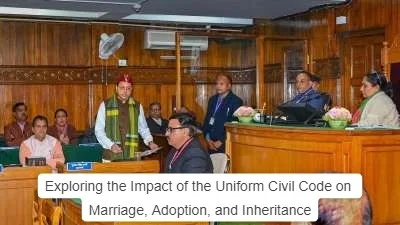Exploring the Impact of the Uniform Civil Code on Marriage, Adoption, and Inheritance

Exploring the Impact of the Uniform Civil Code on Marriage, Adoption, and Inheritance
The adoption of the Uniform Civil Code (UCC) in Uttarakhand brings forth significant changes in the legal landscape, aiming to create a common law for marriage, divorce, inheritance of property, and live-in relationships across religions, except for tribal communities. The UCC seeks to unify personal laws currently followed by Hindus, Muslims, Christians, and other minority groups.
The UCC proposes a single law applicable to all religious communities, streamlining diverse laws related to marriage, divorce, adoption, inheritance, succession, and guardianship. Existing laws, such as the Hindu Marriage Act (1955), Hindu Succession Act (1956), and Muslim Personal Law Application Act (1937), will be technically dissolved.
The UCC brings several changes, including the ban on polygamy, establishment of a minimum marriageable age, equal rights for men and women in divorce, shared ancestral property rights, and protection of adopted children, as well as those born out of wedlock or through surrogacy. It prohibits marriages between relatives like cousins and uncles, ensuring equal inheritance rights for sons and daughters.
Furthermore, the UCC introduces regulations for consensual sexual relationships outside marriage, requiring partners to notify the Registrar of entering or terminating a live-in relationship within a month. Failure to comply could lead to a six-month sentence. Children from such relationships will be recognized as legitimate, and women will be entitled to maintenance.
Additionally, the UCC addresses practices under Muslim personal law, making halala, iddat, and triple talaq punishable offenses, with provisions for imprisonment or fines. In cases of divorce or domestic disputes, the custody of a child up to 5 years old will remain with the mother.
The UCC, while unifying personal laws, also emphasizes gender equality, protection of children, and the regulation of various aspects of personal relationships, marking a significant step towards a more standardized legal framework in India.









